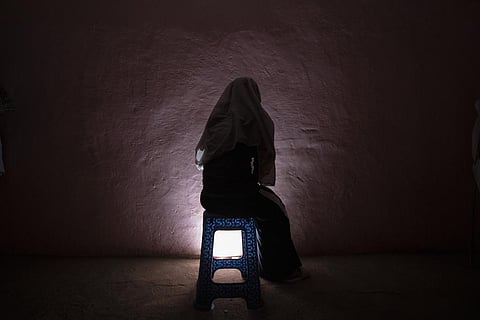

NAIROBI: Scores of women and girls in Ethiopia’s northern Tigray region were sexually assaulted, often by multiple men alleged to be combatants, after a peace agreement last year ended the conflict there, according to a new study of medical records released on Thursday.
The youngest girl raped was 8 years old.
The Tigray conflict killed hundreds of thousands of people and left untold thousands of women and girls with the trauma of sexual assault.
At least 128 sexual assaults occurred after the peace agreement was signed last November, according to the study, which looked at records from the start of the conflict in November 2020 through June.
With most health facilities destroyed or looted as Ethiopian forces battled Tigray fighters, many women and girls were left without treatment for months. Some now have HIV or are raising the children of their rapists. Others live with incontinence or chronic pain, along with the cultural stigma around such attacks.
The study by Physicians for Human Rights and the Organization for Justice and Accountability in the Horn of Africa, along with a commentary in The Lancet medical journal, looked at more than 300 randomly selected medical records from Tigray health centers focused on helping survivors of sexual violence.
It is just a “small glimpse” of the toll, the authors say, and they fear the chance for justice will be lost if independent accountability efforts by the United Nations and others are shut down.
“All the community is a victim of sexual violence,” a Tigray-based researcher into conflict-related sexual violence told The Associated Press. A collaborator on the study, he has spoken with hundreds of women and girls and said not one feels healed.
“Rape survivors, they are suffering the most,” he said. Like many Tigrayans, he spoke on condition of anonymity for fear of retaliation from Ethiopian authorities.
At least 128 sexual assaults occurred after the peace agreement was signed last November, according to the study, which looked at records from the start of the conflict in November 2020 through this June.
Overall, 76% of the 304 women and girls whose cases were reviewed were sexually assaulted by multiple people, often three or more. One was assaulted by 19 men.
In 94% of all cases, no condom was used. Many perpetrators also wielded guns, sticks or knives. Some women and girls were abducted for repeated assaults.
“They took her to their camp and raped her for six months,” one medical record cited by the study says.
Almost all the women and girls said their attackers appeared to be members of a military group, often from neighbouring Eritrea, whose soldiers fought alongside Ethiopian forces against Tigray fighters and allegedly remain in parts of western and northern Tigray.
The findings suggest that “these acts were neither isolated nor random but a systematic use of rape as a weapon of war,” the study’s authors write in The Lancet commentary.
Spokesmen for Ethiopia’s and Eritrea’s governments did not respond to requests for comment.
“It is absolutely horrifying and devastating to even read the narratives of the patients,” Ranit Mishori, a senior medical adviser with Physicians for Human Rights, said in an interview. “The brutality didn’t skip the children. Many were also raped by multiple perpetrators.”
Mishori and her colleague, senior program officer Lindsey Green, expressed concern that independent efforts to understand the conflict’s toll and bring accountability to the perpetrators are being weakened or shut down under pressure from authorities.
“Most disturbing to me is the lack of focus on these crimes,” Green said.
Ethiopia’s government is keen to re-engage with key partners such as the United States, the European Union and global financial institutions after the conflict. On Thursday, Ethiopia was announced as an incoming member of the BRICS economic bloc.
But Ethiopia has sharply criticized outside efforts to promote justice and accountability. An African Union human rights inquiry was quietly terminated earlier this year.
Now Ethiopia wants a United Nations inquiry ended, too, human rights experts say.
After a conflict marked by the blockade of the Tigray region of more than 5 million people, with internet and phone links severed and human rights researchers and journalists barred, the lack of independent inquiry means that the civilian toll could remain largely in the shadows as Ethiopia’s government moves on.
“The world has accountability mechanisms, but almost everything is in the hands of diplomats and politicians, which is a recipe for failure,” said Martin Witteveen, an international criminal law expert who worked with the government-created Ethiopian Human Rights Commission until early 2022. He says Ethiopia alone can hardly ensure accountability when its forces and allies committed most of the crimes.
Even now, the study says, survivors of sexual violence in Tigray are still coming forward, but others will never be known.